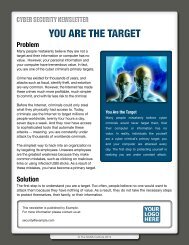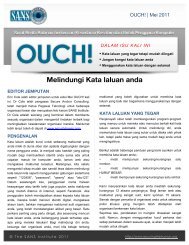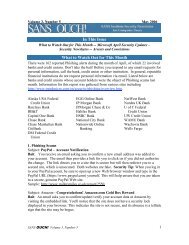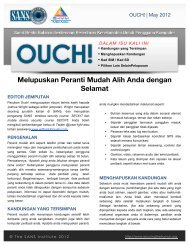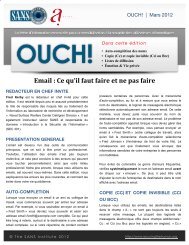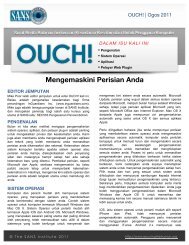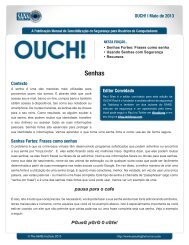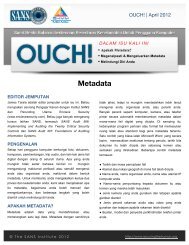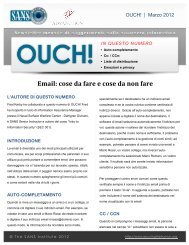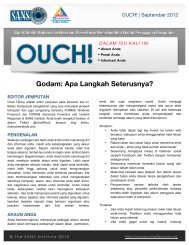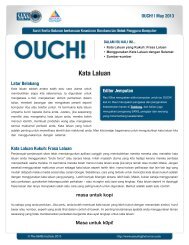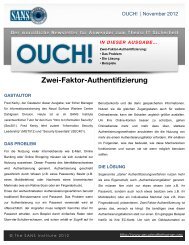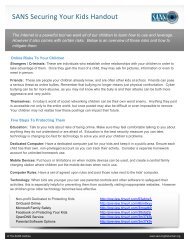1. What to Watch Out for This Month - Securing the Human
1. What to Watch Out for This Month - Securing the Human
1. What to Watch Out for This Month - Securing the Human
Create successful ePaper yourself
Turn your PDF publications into a flip-book with our unique Google optimized e-Paper software.
Volume 3, Number 11 November 2006<br />
In <strong>This</strong> Issue<br />
<strong>1.</strong> <strong>What</strong> <strong>to</strong> <strong>Watch</strong> <strong>Out</strong> <strong>for</strong> <strong>This</strong> <strong>Month</strong> – 2. MorePhishing – 3. Hoaxes – 4. Virus<br />
Alerts 5. Microsoft and Mac Security Updates – 6. Security Screw-Up of <strong>the</strong> <strong>Month</strong><br />
7. Security Newsbytes – 8. Security Question of <strong>the</strong> <strong>Month</strong><br />
<strong>1.</strong> <strong>What</strong> <strong>to</strong> <strong>Watch</strong> <strong>Out</strong> <strong>for</strong> <strong>This</strong> <strong>Month</strong><br />
There were 180 reported Phishing alerts during <strong>the</strong> month of Oc<strong>to</strong>ber, of which 106<br />
involved <strong>the</strong> following banks and credit unions. Don't take <strong>the</strong> bait! Be<strong>for</strong>e you respond<br />
<strong>to</strong> any email requests <strong>for</strong> personal in<strong>for</strong>mation, call your bank, credit union or o<strong>the</strong>r<br />
institution. In general, reputable financial institutions do not request personal in<strong>for</strong>mation<br />
via email. Listed below are banks and credit unions whose account holders were <strong>the</strong><br />
object of Phishing scams last month. In<strong>for</strong>mation <strong>for</strong> this report was ga<strong>the</strong>red from<br />
various sites including:<br />
http://www.trendmicro.com/en/security/phishing/overview.htm<br />
http://www.millersmiles.co.uk<br />
Alliance Bank<br />
BB&T<br />
Bank of America<br />
Bank of America<br />
Military Bank<br />
Barclays Bank<br />
Bendigo Bank<br />
Brattleboro Savings & Loan<br />
Central Willamette<br />
Community Credit Union<br />
Chase Bank<br />
CitiBank<br />
Commonwealth Bank of<br />
Australia<br />
Consumers Cooperative<br />
Credit Union<br />
Co-operative Bank of UK<br />
Desjardins Bank<br />
Egg Bank (Formerly<br />
Prudential Banking plc)<br />
Empire Federal<br />
Credit Union<br />
FAIRWINDS Credit Union<br />
JPMorgan Chase & Co<br />
Halifax Bank<br />
HSBC Bank<br />
Lloyds TSB Bank<br />
National Australia Bank<br />
Nationwide Bank<br />
Nationwide Online Banking<br />
Navy Federal Credit Union<br />
North Fork Bank<br />
Royal Bank of Canada<br />
Scott Credit Union<br />
Sears Bank<br />
Sovereign Bank<br />
Staley Credit Union<br />
Teachers Credit Union<br />
Wachovia Bank<br />
WAMU Bank<br />
Warren Federal<br />
Credit Union<br />
Wells Fargo Bank<br />
Westpac Bank<br />
Zions Bank<br />
2. More Phishing<br />
Subject: Earthlink – “IMPORTANT: Alert about your Earthlink billing<br />
in<strong>for</strong>mation on file.”<br />
Bait: A phony email, allegedly sent from Billing@Earthlink.net, inviting you <strong>to</strong> update<br />
your Earthlink personal in<strong>for</strong>mation, which includes an embedded link directing you <strong>to</strong><br />
an unsecured, fake website.<br />
Security Tip: The spoofed website looks nothing like an actual Earthlink webpage.<br />
Sample: http://www.millersmiles.co.uk/report/3569<br />
Subject: PayPal – “Congratulations!!!”<br />
Bait: A phony email, allegedly sent from service@paypal.com, stating that you have been<br />
chosen by PayPal’s online department <strong>to</strong> take part in a quick and easy 5 question survey,<br />
in return <strong>for</strong> which you will receive a credit of $100 <strong>to</strong> your account, and inviting you <strong>to</strong><br />
SANS OUCH! Volume 3, Number 11 1
click on <strong>the</strong> embedded link and take part in this unique offer. However, <strong>the</strong> link takes you<br />
<strong>to</strong> a fake, phishing website.<br />
Security Tip: PayPal never sends emails requesting personal in<strong>for</strong>mation in this way.<br />
The spoofed website looks nothing like an actual PayPal webpage.<br />
Sample: http://www.millersmiles.co.uk/report/3684<br />
Subject: eBay – “Violation Concerning Your Ebay Account”<br />
Bait: A phony email, allegedly sent from update@validationserver.net, stating that <strong>the</strong>re<br />
is a dispute about an auction and that an eBay member, kuhawkers (84), has indicated<br />
that he already paid <strong>for</strong> item #216573321157. The embedded link, which invites you <strong>to</strong><br />
submit details regarding <strong>the</strong> payment, leads <strong>to</strong> a fake website.<br />
Security Tip: eBay never sends <strong>the</strong>ir users emails requesting personal details in this way.<br />
The spoofed website looks nothing like an actual eBay webpage.<br />
Sample: http://www.millersmiles.co.uk/report/3680<br />
3. Hoaxes<br />
ATM Security Advice Email: Enter PIN in Reverse <strong>to</strong> call <strong>the</strong> Police.<br />
An email advising ATM users that if you are <strong>for</strong>ced by robbers <strong>to</strong> withdraw money from<br />
an ATM, you can secretly alert police by entering your PIN in reverse. Although such<br />
technology exists, it has never been deployed, and <strong>the</strong> claim is not true.<br />
More in<strong>for</strong>mation: http://www.hoax-slayer.com/reverse-pin-ATM.shtml<br />
4. Virus Alerts<br />
QQpass spyware – Trojan variant<br />
As many as 100,000 Flash MP3 players, given away as prizes by McDonald’s in Japan,<br />
were found <strong>to</strong> be infected with a variant of <strong>the</strong> QQpass spyware Trojan horse program.<br />
The players were preloaded with ten songs and <strong>the</strong> malware. McDonald’s Japan has<br />
apologized, established a helpline <strong>to</strong> facilitate <strong>the</strong> recall of <strong>the</strong> infected MP3 players, and<br />
posted directions <strong>for</strong> cleaning infected PCs.<br />
More in<strong>for</strong>mation:<br />
http://www.<strong>the</strong>register.co.uk/2006/10/16/mcd_spyware_mp3_recall/print.html<br />
RavMonE.exe – Virus<br />
Apple has announced that a small number of <strong>the</strong> Video iPods available <strong>for</strong> purchase after<br />
September 12, 2006, left <strong>the</strong>ir contract manufacturer carrying <strong>the</strong> Windows<br />
RavMonE.exe virus. According <strong>to</strong> Apple, <strong>the</strong>y have seen fewer than 25 reports<br />
concerning this problem, and <strong>the</strong> iPod nano, iPod shuffle and Mac OS X are not affected.<br />
Apple says that Video iPods now shipping are virus free.<br />
More in<strong>for</strong>mation: http://www.apple.com/support/windowsvirus/<br />
5. Microsoft and Mac Security Updates<br />
Microsoft and Apple provide free security updates <strong>for</strong> <strong>the</strong> Windows and Mac OS X<br />
operating systems.<br />
Windows: Microsoft issues patches <strong>for</strong> all Microsoft products on <strong>the</strong> second Tuesday of<br />
each month and occasionally out-of-cycle on any day of <strong>the</strong> month. The next scheduled<br />
release date is November 14 th .<br />
More in<strong>for</strong>mation:<br />
http://www.microsoft.com/athome/security/protect/windowsxpsp2/wsc.mspx<br />
SANS OUCH! Volume 3, Number 11 2
OS X: Updates are issued frequently, and <strong>the</strong>ir contents may differ depending on which<br />
processor is in your Mac (PPC or Intel).<br />
More in<strong>for</strong>mation: http://www.apple.com/support/downloads/<br />
Security Tip: Be sure your operating system is set <strong>to</strong> retrieve and install updates<br />
au<strong>to</strong>matically.<br />
Windows:<br />
http://www.microsoft.com/athome/security/update/bulletins/au<strong>to</strong>maticupdates.mspx<br />
OS X: http://docs.info.apple.com/article.html?artnum=106704<br />
Check manually, <strong>to</strong>o, once every two weeks <strong>to</strong> make sure all of <strong>the</strong> updates have been<br />
installed.<br />
6. Security Screw-Up of <strong>the</strong> <strong>Month</strong><br />
Prescription <strong>for</strong> Wriggling<br />
Hackers broke in<strong>to</strong> Akron Children's Hospital’s computer files over Labor Day weekend,<br />
and gained access <strong>to</strong> <strong>the</strong> names, addresses, birth dates, and Social Security numbers of<br />
about 230,000 patients and <strong>the</strong>ir families, as well as <strong>to</strong> a database containing <strong>the</strong> bank<br />
account in<strong>for</strong>mation of about 12,000 donors. The hospital did not begin notifying families<br />
until seven weeks after <strong>the</strong> breach was discovered by sending out 10,000 letters, followed<br />
by 120,000 more two days later. As <strong>for</strong> <strong>the</strong> remaining 100,000 notifications, “Everyone<br />
that's going <strong>to</strong> be contacted should know by next Wednesday,” said Bob Howard, <strong>the</strong><br />
hospital's direc<strong>to</strong>r of planning. The hackers gained access <strong>to</strong> <strong>the</strong> hospital's computer<br />
network during an expansion of <strong>the</strong> system. “We don't know that anybody was actually<br />
affected,” Howard said. “All we know is, it's possible. We don't even know if [<strong>the</strong> two<br />
hackers] <strong>to</strong>ok anything.” According <strong>to</strong> a statement on <strong>the</strong> hospital's web site<br />
(www.akronchildrens.org), computer security consultants hired by <strong>the</strong> hospital “found no<br />
evidence that any specific data was downloaded, tampered with or compromised;<br />
however, <strong>the</strong> opportunity <strong>to</strong> view <strong>the</strong> data existed.”<br />
More in<strong>for</strong>mation: http://www.ohio.com/mld/beaconjournal/15871658.htm<br />
[Edi<strong>to</strong>r's note (Reichert): How can any consultant guarantee that evidence would even<br />
exist if a site was so broken <strong>to</strong> start with? More wriggling, in my opinion.]<br />
7. Security Newsbytes<br />
eCards May Deliver More Than Holiday Greetings<br />
Most people never consider <strong>the</strong> dangers of ecards, and <strong>the</strong>re are plenty of dangers. A<br />
legitimate-looking ecard, once clicked and/or downloaded, might turn out <strong>to</strong> be a<br />
phishing ploy, or <strong>to</strong> contain concealed malware. If <strong>the</strong> ecard is from someone you don’t<br />
know, think twice be<strong>for</strong>e opening or downloading it, and always keep <strong>the</strong> security<br />
software on your computer up-<strong>to</strong>-date and in good working condition.<br />
More in<strong>for</strong>mation: http://www.scambusters.org/ecards.html<br />
Apple Wrestles With OSX Security Flaws<br />
Apple has released Mac OS X 10.4.8 (Security Update 2006-006), an update that<br />
addresses 15 flaws in OS X, Safari, and Adobe Flash Player, vulnerabilities that could<br />
allow an attacker <strong>to</strong> take control of a Mac. Some of <strong>the</strong> flaws can be exploited simply by<br />
manipulating <strong>the</strong> user in<strong>to</strong> viewing specially crafted images or websites.<br />
[Edi<strong>to</strong>r's note: (Wyman) Why is Apple so slow on <strong>the</strong> uptake? Mac software is now <strong>the</strong><br />
target of some of <strong>the</strong> very same security exploits that were identified and corrected in <strong>the</strong><br />
Windows world months ago. Predictable Mac vulnerabilities like this can and should be<br />
patched immediately and preemptively.]<br />
SANS OUCH! Volume 3, Number 11 3
More in<strong>for</strong>mation: http://news.com.com/2102-1002_3-6121372.html?tag=st.util.print<br />
Number of Records Breached in US Approaches 100 Million<br />
The Privacy Rights Clearinghouse's running tally of <strong>the</strong> number of records involved in<br />
security breaches is approaching 100,000,000. PRC has been keeping tabs on security<br />
breaches since shortly after <strong>the</strong> ChoicePoint debacle became public in February 2005.<br />
The sheer number of records affected indicates a need <strong>to</strong> go beyond passwords and<br />
encryption <strong>to</strong> ensure security. Organizations also need <strong>to</strong> establish rules <strong>for</strong> who has<br />
access <strong>to</strong> what in<strong>for</strong>mation, where it is s<strong>to</strong>red, and when, where and why it is moved.<br />
More in<strong>for</strong>mation: http://www.technewsworld.com/s<strong>to</strong>ry/53222.html<br />
Theft by Malware<br />
The Metropolitan Police Computer Crime Unit is investigating <strong>the</strong> <strong>the</strong>ft of credit card<br />
data and passwords from thousands of personal computers in <strong>the</strong> United Kingdom and<br />
potentially tens of thousands more around <strong>the</strong> world. The s<strong>to</strong>len data, harvested using<br />
Backdoor blended-threat malware, were discovered s<strong>to</strong>red on a computer in <strong>the</strong> United<br />
States.<br />
More in<strong>for</strong>mation: http://www.guardian.co.uk/uklatest/s<strong>to</strong>ry/0,,-6139406,00.html<br />
FBI’s Imprimatur Added <strong>to</strong> Phishing Scams<br />
Fraudulent phishing e-mails claiming <strong>to</strong> be from Richard Mueller III, FBI Direc<strong>to</strong>r, and<br />
Donna M. Uzzell, FBI Compact Council Chairman, offer recipients big bucks and<br />
threaten big penalties if you don’t cooperate.<br />
More in<strong>for</strong>mation:<br />
http://www.emergencyemail.org/newsemergency/anmviewer.asp?a=155&z=1<br />
Anti-Social Uses <strong>for</strong> Internet Social Networks<br />
Web-based social networks, such as MySpace, Facebook and Flickr provide a new way<br />
<strong>for</strong> Netizens <strong>to</strong> meet friends, trade in<strong>for</strong>mation, and share pictures. But <strong>the</strong>y are also a<br />
way <strong>for</strong> miscreants <strong>to</strong> spread malware. Recent exploits <strong>for</strong> Internet Explorer were found<br />
in poison banner ads on MySpace, Webshots, and many o<strong>the</strong>r sites. You can help keep<br />
your computer safe by running anti-virus, a firewall and one or more anti-spyware<br />
programs.<br />
More in<strong>for</strong>mation:<br />
http://www.pcworld.com/article/id,127347-c,onlinesecurity/article.html<br />
8. Security Question of <strong>the</strong> <strong>Month</strong><br />
<strong>What</strong> is a “Zero-Day Exploit?<br />
A zero-day exploit (attack) is one that takes advantage of a security vulnerability be<strong>for</strong>e<br />
or on <strong>the</strong> day that <strong>the</strong> existence of <strong>the</strong> vulnerability becomes widely known. Three or four<br />
years ago, hackers needed 7-14 days <strong>to</strong> figure out how <strong>to</strong> use a newly discovered vulnerability<br />
in order <strong>to</strong> launch an exploit. That “lead time” allowed hardware manufacturers and<br />
software developers <strong>to</strong> notify <strong>the</strong>ir cus<strong>to</strong>mers, recommend ways <strong>to</strong> cope with it, and<br />
distribute software patches and anti-virus updates.<br />
But <strong>the</strong>re are more hackers, and <strong>the</strong>y’re getting better at what <strong>the</strong>y do. So, how do you<br />
defend your computer when you have 0 days <strong>to</strong> prepare? You can’t. But if you keep your<br />
computer security software up-<strong>to</strong>-date, you’ll help decrease your overall risk and increase<br />
<strong>the</strong> chances that a patch or update will reach your computer ahead of an exploit.<br />
SANS OUCH! Volume 3, Number 11 4
Copyright 2006, SANS Institute (www.sans.org).<br />
Edi<strong>to</strong>rial Board: Dave Moore, Bill Wyman, Alan Reichert, Barbara Rietveld, Alan Paller.<br />
Permission is hereby granted <strong>for</strong> any person <strong>to</strong> redistribute this in whole or in part <strong>to</strong> any<br />
o<strong>the</strong>r persons as long as <strong>the</strong> distribution is not being made as part of any commercial<br />
service or as part of a promotion or marketing ef<strong>for</strong>t <strong>for</strong> any commercial service or<br />
product. Readers are invited <strong>to</strong> subscribe <strong>for</strong> free at https://www.sans.org/newsletters/ouch.<br />
SANS OUCH! Volume 3, Number 11 5



